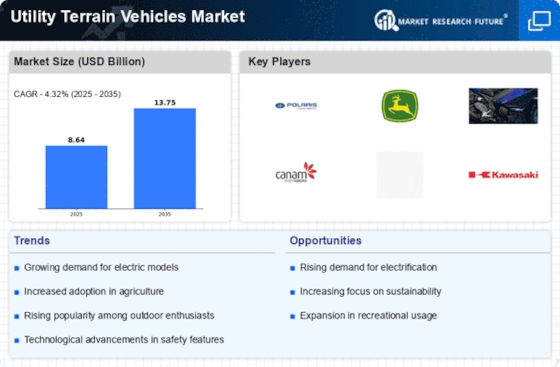-
EXECUTIVE SUMMARY
-
Market Overview
-
Key Findings
-
Market Segmentation
-
Competitive Landscape
-
Challenges and Opportunities
-
Future Outlook
-
MARKET INTRODUCTION
-
Definition
-
Scope of the study
- Research Objective
- Assumption
- Limitations
-
RESEARCH METHODOLOGY
-
Overview
-
Data Mining
-
Secondary Research
-
Primary Research
- Primary Interviews and Information Gathering Process
- Breakdown of Primary Respondents
-
Forecasting Model
-
Market Size Estimation
- Bottom-Up Approach
- Top-Down Approach
-
Data Triangulation
-
Validation
-
MARKET DYNAMICS
-
Overview
-
Drivers
-
Restraints
-
Opportunities
-
MARKET FACTOR ANALYSIS
-
Value chain Analysis
-
Porter's Five Forces Analysis
- Bargaining Power of Suppliers
- Bargaining Power of Buyers
- Threat of New Entrants
- Threat of Substitutes
- Intensity of Rivalry
-
COVID-19 Impact Analysis
- Market Impact Analysis
- Regional Impact
- Opportunity and Threat Analysis
-
UTILITY TERRAIN VEHICLES MARKET, BY APPLICATION (USD BILLION)
-
Recreation
-
Transportation
-
Agriculture
-
Construction
-
UTILITY TERRAIN VEHICLES MARKET, BY ENGINE TYPE (USD BILLION)
-
Internal Combustion Engine
-
Electric Engine
-
Hybrid Engine
-
UTILITY TERRAIN VEHICLES MARKET, BY PASSENGER CAPACITY (USD BILLION)
-
Two-Seater
-
Four-Seater
-
Six-Seater
-
Eight-Seater
-
UTILITY TERRAIN VEHICLES MARKET, BY FUEL TYPE (USD BILLION)
-
Gasoline
-
Diesel
-
Electric
-
UTILITY TERRAIN VEHICLES MARKET, BY REGIONAL (USD BILLION)
-
North America
- US
- Canada
-
Europe
- Germany
- UK
- France
- Russia
- Italy
- Spain
- Rest of Europe
-
APAC
- China
- India
- Japan
- South Korea
- Malaysia
- Thailand
- Indonesia
- Rest of APAC
-
South America
- Brazil
- Mexico
- Argentina
- Rest of South America
-
MEA
- GCC Countries
- South Africa
- Rest of MEA
-
COMPETITIVE LANDSCAPE
-
Overview
-
Competitive Analysis
-
Market share Analysis
-
Major Growth Strategy in the Utility Terrain Vehicles Market
-
Competitive Benchmarking
-
Leading Players in Terms of Number of Developments in the Utility Terrain Vehicles Market
-
Key developments and growth strategies
- New Product Launch/Service Deployment
- Merger & Acquisitions
- Joint Ventures
-
Major Players Financial Matrix
- Sales and Operating Income
- Major Players R&D Expenditure. 2023
-
COMPANY PROFILES
-
Kubota Corporation
- Financial Overview
- Products Offered
- Key Developments
- SWOT Analysis
- Key Strategies
-
BRP
- Financial Overview
- Products Offered
- Key Developments
- SWOT Analysis
- Key Strategies
-
Suzuki Motor
- Financial Overview
- Products Offered
- Key Developments
- SWOT Analysis
- Key Strategies
-
Honda Motor
- Financial Overview
- Products Offered
- Key Developments
- SWOT Analysis
- Key Strategies
-
Hisun Motor
- Financial Overview
- Products Offered
- Key Developments
- SWOT Analysis
- Key Strategies
-
Kawasaki Heavy Industries
- Financial Overview
- Products Offered
- Key Developments
- SWOT Analysis
- Key Strategies
-
Mahindra and Mahindra
- Financial Overview
- Products Offered
- Key Developments
- SWOT Analysis
- Key Strategies
-
John Deere
- Financial Overview
- Products Offered
- Key Developments
- SWOT Analysis
- Key Strategies
-
CFMOTO
- Financial Overview
- Products Offered
- Key Developments
- SWOT Analysis
- Key Strategies
-
Textron
- Financial Overview
- Products Offered
- Key Developments
- SWOT Analysis
- Key Strategies
-
Polaris Industries
- Financial Overview
- Products Offered
- Key Developments
- SWOT Analysis
- Key Strategies
-
Yamaha Motor
- Financial Overview
- Products Offered
- Key Developments
- SWOT Analysis
- Key Strategies
-
CanAm
- Financial Overview
- Products Offered
- Key Developments
- SWOT Analysis
- Key Strategies
-
Arctic Cat
- Financial Overview
- Products Offered
- Key Developments
- SWOT Analysis
- Key Strategies
-
TGB Motor
- Financial Overview
- Products Offered
- Key Developments
- SWOT Analysis
- Key Strategies
-
APPENDIX
-
References
-
Related Reports
-
LIST OF TABLES
-
LIST OF ASSUMPTIONS
-
NORTH AMERICA UTILITY TERRAIN VEHICLES MARKET SIZE ESTIMATES & FORECAST, BY APPLICATION, 2019-2032 (USD BILLIONS)
-
NORTH AMERICA UTILITY TERRAIN VEHICLES MARKET SIZE ESTIMATES & FORECAST, BY ENGINE TYPE, 2019-2032 (USD BILLIONS)
-
NORTH AMERICA UTILITY TERRAIN VEHICLES MARKET SIZE ESTIMATES & FORECAST, BY PASSENGER CAPACITY, 2019-2032 (USD BILLIONS)
-
NORTH AMERICA UTILITY TERRAIN VEHICLES MARKET SIZE ESTIMATES & FORECAST, BY FUEL TYPE, 2019-2032 (USD BILLIONS)
-
NORTH AMERICA UTILITY TERRAIN VEHICLES MARKET SIZE ESTIMATES & FORECAST, BY REGIONAL, 2019-2032 (USD BILLIONS)
-
US UTILITY TERRAIN VEHICLES MARKET SIZE ESTIMATES & FORECAST, BY APPLICATION, 2019-2032 (USD BILLIONS)
-
US UTILITY TERRAIN VEHICLES MARKET SIZE ESTIMATES & FORECAST, BY ENGINE TYPE, 2019-2032 (USD BILLIONS)
-
US UTILITY TERRAIN VEHICLES MARKET SIZE ESTIMATES & FORECAST, BY PASSENGER CAPACITY, 2019-2032 (USD BILLIONS)
-
US UTILITY TERRAIN VEHICLES MARKET SIZE ESTIMATES & FORECAST, BY FUEL TYPE, 2019-2032 (USD BILLIONS)
-
US UTILITY TERRAIN VEHICLES MARKET SIZE ESTIMATES & FORECAST, BY REGIONAL, 2019-2032 (USD BILLIONS)
-
CANADA UTILITY TERRAIN VEHICLES MARKET SIZE ESTIMATES & FORECAST, BY APPLICATION, 2019-2032 (USD BILLIONS)
-
CANADA UTILITY TERRAIN VEHICLES MARKET SIZE ESTIMATES & FORECAST, BY ENGINE TYPE, 2019-2032 (USD BILLIONS)
-
CANADA UTILITY TERRAIN VEHICLES MARKET SIZE ESTIMATES & FORECAST, BY PASSENGER CAPACITY, 2019-2032 (USD BILLIONS)
-
CANADA UTILITY TERRAIN VEHICLES MARKET SIZE ESTIMATES & FORECAST, BY FUEL TYPE, 2019-2032 (USD BILLIONS)
-
CANADA UTILITY TERRAIN VEHICLES MARKET SIZE ESTIMATES & FORECAST, BY REGIONAL, 2019-2032 (USD BILLIONS)
-
EUROPE UTILITY TERRAIN VEHICLES MARKET SIZE ESTIMATES & FORECAST, BY APPLICATION, 2019-2032 (USD BILLIONS)
-
EUROPE UTILITY TERRAIN VEHICLES MARKET SIZE ESTIMATES & FORECAST, BY ENGINE TYPE, 2019-2032 (USD BILLIONS)
-
EUROPE UTILITY TERRAIN VEHICLES MARKET SIZE ESTIMATES & FORECAST, BY PASSENGER CAPACITY, 2019-2032 (USD BILLIONS)
-
EUROPE UTILITY TERRAIN VEHICLES MARKET SIZE ESTIMATES & FORECAST, BY FUEL TYPE, 2019-2032 (USD BILLIONS)
-
EUROPE UTILITY TERRAIN VEHICLES MARKET SIZE ESTIMATES & FORECAST, BY REGIONAL, 2019-2032 (USD BILLIONS)
-
GERMANY UTILITY TERRAIN VEHICLES MARKET SIZE ESTIMATES & FORECAST, BY APPLICATION, 2019-2032 (USD BILLIONS)
-
GERMANY UTILITY TERRAIN VEHICLES MARKET SIZE ESTIMATES & FORECAST, BY ENGINE TYPE, 2019-2032 (USD BILLIONS)
-
GERMANY UTILITY TERRAIN VEHICLES MARKET SIZE ESTIMATES & FORECAST, BY PASSENGER CAPACITY, 2019-2032 (USD BILLIONS)
-
GERMANY UTILITY TERRAIN VEHICLES MARKET SIZE ESTIMATES & FORECAST, BY FUEL TYPE, 2019-2032 (USD BILLIONS)
-
GERMANY UTILITY TERRAIN VEHICLES MARKET SIZE ESTIMATES & FORECAST, BY REGIONAL, 2019-2032 (USD BILLIONS)
-
UK UTILITY TERRAIN VEHICLES MARKET SIZE ESTIMATES & FORECAST, BY APPLICATION, 2019-2032 (USD BILLIONS)
-
UK UTILITY TERRAIN VEHICLES MARKET SIZE ESTIMATES & FORECAST, BY ENGINE TYPE, 2019-2032 (USD BILLIONS)
-
UK UTILITY TERRAIN VEHICLES MARKET SIZE ESTIMATES & FORECAST, BY PASSENGER CAPACITY, 2019-2032 (USD BILLIONS)
-
UK UTILITY TERRAIN VEHICLES MARKET SIZE ESTIMATES & FORECAST, BY FUEL TYPE, 2019-2032 (USD BILLIONS)
-
UK UTILITY TERRAIN VEHICLES MARKET SIZE ESTIMATES & FORECAST, BY REGIONAL, 2019-2032 (USD BILLIONS)
-
FRANCE UTILITY TERRAIN VEHICLES MARKET SIZE ESTIMATES & FORECAST, BY APPLICATION, 2019-2032 (USD BILLIONS)
-
FRANCE UTILITY TERRAIN VEHICLES MARKET SIZE ESTIMATES & FORECAST, BY ENGINE TYPE, 2019-2032 (USD BILLIONS)
-
FRANCE UTILITY TERRAIN VEHICLES MARKET SIZE ESTIMATES & FORECAST, BY PASSENGER CAPACITY, 2019-2032 (USD BILLIONS)
-
FRANCE UTILITY TERRAIN VEHICLES MARKET SIZE ESTIMATES & FORECAST, BY FUEL TYPE, 2019-2032 (USD BILLIONS)
-
FRANCE UTILITY TERRAIN VEHICLES MARKET SIZE ESTIMATES & FORECAST, BY REGIONAL, 2019-2032 (USD BILLIONS)
-
RUSSIA UTILITY TERRAIN VEHICLES MARKET SIZE ESTIMATES & FORECAST, BY APPLICATION, 2019-2032 (USD BILLIONS)
-
RUSSIA UTILITY TERRAIN VEHICLES MARKET SIZE ESTIMATES & FORECAST, BY ENGINE TYPE, 2019-2032 (USD BILLIONS)
-
RUSSIA UTILITY TERRAIN VEHICLES MARKET SIZE ESTIMATES & FORECAST, BY PASSENGER CAPACITY, 2019-2032 (USD BILLIONS)
-
RUSSIA UTILITY TERRAIN VEHICLES MARKET SIZE ESTIMATES & FORECAST, BY FUEL TYPE, 2019-2032 (USD BILLIONS)
-
RUSSIA UTILITY TERRAIN VEHICLES MARKET SIZE ESTIMATES & FORECAST, BY REGIONAL, 2019-2032 (USD BILLIONS)
-
ITALY UTILITY TERRAIN VEHICLES MARKET SIZE ESTIMATES & FORECAST, BY APPLICATION, 2019-2032 (USD BILLIONS)
-
ITALY UTILITY TERRAIN VEHICLES MARKET SIZE ESTIMATES & FORECAST, BY ENGINE TYPE, 2019-2032 (USD BILLIONS)
-
ITALY UTILITY TERRAIN VEHICLES MARKET SIZE ESTIMATES & FORECAST, BY PASSENGER CAPACITY, 2019-2032 (USD BILLIONS)
-
ITALY UTILITY TERRAIN VEHICLES MARKET SIZE ESTIMATES & FORECAST, BY FUEL TYPE, 2019-2032 (USD BILLIONS)
-
ITALY UTILITY TERRAIN VEHICLES MARKET SIZE ESTIMATES & FORECAST, BY REGIONAL, 2019-2032 (USD BILLIONS)
-
SPAIN UTILITY TERRAIN VEHICLES MARKET SIZE ESTIMATES & FORECAST, BY APPLICATION, 2019-2032 (USD BILLIONS)
-
SPAIN UTILITY TERRAIN VEHICLES MARKET SIZE ESTIMATES & FORECAST, BY ENGINE TYPE, 2019-2032 (USD BILLIONS)
-
SPAIN UTILITY TERRAIN VEHICLES MARKET SIZE ESTIMATES & FORECAST, BY PASSENGER CAPACITY, 2019-2032 (USD BILLIONS)
-
SPAIN UTILITY TERRAIN VEHICLES MARKET SIZE ESTIMATES & FORECAST, BY FUEL TYPE, 2019-2032 (USD BILLIONS)
-
SPAIN UTILITY TERRAIN VEHICLES MARKET SIZE ESTIMATES & FORECAST, BY REGIONAL, 2019-2032 (USD BILLIONS)
-
REST OF EUROPE UTILITY TERRAIN VEHICLES MARKET SIZE ESTIMATES & FORECAST, BY APPLICATION, 2019-2032 (USD BILLIONS)
-
REST OF EUROPE UTILITY TERRAIN VEHICLES MARKET SIZE ESTIMATES & FORECAST, BY ENGINE TYPE, 2019-2032 (USD BILLIONS)
-
REST OF EUROPE UTILITY TERRAIN VEHICLES MARKET SIZE ESTIMATES & FORECAST, BY PASSENGER CAPACITY, 2019-2032 (USD BILLIONS)
-
REST OF EUROPE UTILITY TERRAIN VEHICLES MARKET SIZE ESTIMATES & FORECAST, BY FUEL TYPE, 2019-2032 (USD BILLIONS)
-
REST OF EUROPE UTILITY TERRAIN VEHICLES MARKET SIZE ESTIMATES & FORECAST, BY REGIONAL, 2019-2032 (USD BILLIONS)
-
APAC UTILITY TERRAIN VEHICLES MARKET SIZE ESTIMATES & FORECAST, BY APPLICATION, 2019-2032 (USD BILLIONS)
-
APAC UTILITY TERRAIN VEHICLES MARKET SIZE ESTIMATES & FORECAST, BY ENGINE TYPE, 2019-2032 (USD BILLIONS)
-
APAC UTILITY TERRAIN VEHICLES MARKET SIZE ESTIMATES & FORECAST, BY PASSENGER CAPACITY, 2019-2032 (USD BILLIONS)
-
APAC UTILITY TERRAIN VEHICLES MARKET SIZE ESTIMATES & FORECAST, BY FUEL TYPE, 2019-2032 (USD BILLIONS)
-
APAC UTILITY TERRAIN VEHICLES MARKET SIZE ESTIMATES & FORECAST, BY REGIONAL, 2019-2032 (USD BILLIONS)
-
CHINA UTILITY TERRAIN VEHICLES MARKET SIZE ESTIMATES & FORECAST, BY APPLICATION, 2019-2032 (USD BILLIONS)
-
CHINA UTILITY TERRAIN VEHICLES MARKET SIZE ESTIMATES & FORECAST, BY ENGINE TYPE, 2019-2032 (USD BILLIONS)
-
CHINA UTILITY TERRAIN VEHICLES MARKET SIZE ESTIMATES & FORECAST, BY PASSENGER CAPACITY, 2019-2032 (USD BILLIONS)
-
CHINA UTILITY TERRAIN VEHICLES MARKET SIZE ESTIMATES & FORECAST, BY FUEL TYPE, 2019-2032 (USD BILLIONS)
-
CHINA UTILITY TERRAIN VEHICLES MARKET SIZE ESTIMATES & FORECAST, BY REGIONAL, 2019-2032 (USD BILLIONS)
-
INDIA UTILITY TERRAIN VEHICLES MARKET SIZE ESTIMATES & FORECAST, BY APPLICATION, 2019-2032 (USD BILLIONS)
-
INDIA UTILITY TERRAIN VEHICLES MARKET SIZE ESTIMATES & FORECAST, BY ENGINE TYPE, 2019-2032 (USD BILLIONS)
-
INDIA UTILITY TERRAIN VEHICLES MARKET SIZE ESTIMATES & FORECAST, BY PASSENGER CAPACITY, 2019-2032 (USD BILLIONS)
-
INDIA UTILITY TERRAIN VEHICLES MARKET SIZE ESTIMATES & FORECAST, BY FUEL TYPE, 2019-2032 (USD BILLIONS)
-
INDIA UTILITY TERRAIN VEHICLES MARKET SIZE ESTIMATES & FORECAST, BY REGIONAL, 2019-2032 (USD BILLIONS)
-
JAPAN UTILITY TERRAIN VEHICLES MARKET SIZE ESTIMATES & FORECAST, BY APPLICATION, 2019-2032 (USD BILLIONS)
-
JAPAN UTILITY TERRAIN VEHICLES MARKET SIZE ESTIMATES & FORECAST, BY ENGINE TYPE, 2019-2032 (USD BILLIONS)
-
JAPAN UTILITY TERRAIN VEHICLES MARKET SIZE ESTIMATES & FORECAST, BY PASSENGER CAPACITY, 2019-2032 (USD BILLIONS)
-
JAPAN UTILITY TERRAIN VEHICLES MARKET SIZE ESTIMATES & FORECAST, BY FUEL TYPE, 2019-2032 (USD BILLIONS)
-
JAPAN UTILITY TERRAIN VEHICLES MARKET SIZE ESTIMATES & FORECAST, BY REGIONAL, 2019-2032 (USD BILLIONS)
-
SOUTH KOREA UTILITY TERRAIN VEHICLES MARKET SIZE ESTIMATES & FORECAST, BY APPLICATION, 2019-2032 (USD BILLIONS)
-
SOUTH KOREA UTILITY TERRAIN VEHICLES MARKET SIZE ESTIMATES & FORECAST, BY ENGINE TYPE, 2019-2032 (USD BILLIONS)
-
SOUTH KOREA UTILITY TERRAIN VEHICLES MARKET SIZE ESTIMATES & FORECAST, BY PASSENGER CAPACITY, 2019-2032 (USD BILLIONS)
-
SOUTH KOREA UTILITY TERRAIN VEHICLES MARKET SIZE ESTIMATES & FORECAST, BY FUEL TYPE, 2019-2032 (USD BILLIONS)
-
SOUTH KOREA UTILITY TERRAIN VEHICLES MARKET SIZE ESTIMATES & FORECAST, BY REGIONAL, 2019-2032 (USD BILLIONS)
-
MALAYSIA UTILITY TERRAIN VEHICLES MARKET SIZE ESTIMATES & FORECAST, BY APPLICATION, 2019-2032 (USD BILLIONS)
-
MALAYSIA UTILITY TERRAIN VEHICLES MARKET SIZE ESTIMATES & FORECAST, BY ENGINE TYPE, 2019-2032 (USD BILLIONS)
-
MALAYSIA UTILITY TERRAIN VEHICLES MARKET SIZE ESTIMATES & FORECAST, BY PASSENGER CAPACITY, 2019-2032 (USD BILLIONS)
-
MALAYSIA UTILITY TERRAIN VEHICLES MARKET SIZE ESTIMATES & FORECAST, BY FUEL TYPE, 2019-2032 (USD BILLIONS)
-
MALAYSIA UTILITY TERRAIN VEHICLES MARKET SIZE ESTIMATES & FORECAST, BY REGIONAL, 2019-2032 (USD BILLIONS)
-
THAILAND UTILITY TERRAIN VEHICLES MARKET SIZE ESTIMATES & FORECAST, BY APPLICATION, 2019-2032 (USD BILLIONS)
-
THAILAND UTILITY TERRAIN VEHICLES MARKET SIZE ESTIMATES & FORECAST, BY ENGINE TYPE, 2019-2032 (USD BILLIONS)
-
THAILAND UTILITY TERRAIN VEHICLES MARKET SIZE ESTIMATES & FORECAST, BY PASSENGER CAPACITY, 2019-2032 (USD BILLIONS)
-
THAILAND UTILITY TERRAIN VEHICLES MARKET SIZE ESTIMATES & FORECAST, BY FUEL TYPE, 2019-2032 (USD BILLIONS)
-
THAILAND UTILITY TERRAIN VEHICLES MARKET SIZE ESTIMATES & FORECAST, BY REGIONAL, 2019-2032 (USD BILLIONS)
-
INDONESIA UTILITY TERRAIN VEHICLES MARKET SIZE ESTIMATES & FORECAST, BY APPLICATION, 2019-2032 (USD BILLIONS)
-
INDONESIA UTILITY TERRAIN VEHICLES MARKET SIZE ESTIMATES & FORECAST, BY ENGINE TYPE, 2019-2032 (USD BILLIONS)
-
INDONESIA UTILITY TERRAIN VEHICLES MARKET SIZE ESTIMATES & FORECAST, BY PASSENGER CAPACITY, 2019-2032 (USD BILLIONS)
-
INDONESIA UTILITY TERRAIN VEHICLES MARKET SIZE ESTIMATES & FORECAST, BY FUEL TYPE, 2019-2032 (USD BILLIONS)
-
INDONESIA UTILITY TERRAIN VEHICLES MARKET SIZE ESTIMATES & FORECAST, BY REGIONAL, 2019-2032 (USD BILLIONS)
-
REST OF APAC UTILITY TERRAIN VEHICLES MARKET SIZE ESTIMATES & FORECAST, BY APPLICATION, 2019-2032 (USD BILLIONS)
-
REST OF APAC UTILITY TERRAIN VEHICLES MARKET SIZE ESTIMATES & FORECAST, BY ENGINE TYPE, 2019-2032 (USD BILLIONS)
-
REST OF APAC UTILITY TERRAIN VEHICLES MARKET SIZE ESTIMATES & FORECAST, BY PASSENGER CAPACITY, 2019-2032 (USD BILLIONS)
-
REST OF APAC UTILITY TERRAIN VEHICLES MARKET SIZE ESTIMATES & FORECAST, BY FUEL TYPE, 2019-2032 (USD BILLIONS)
-
REST OF APAC UTILITY TERRAIN VEHICLES MARKET SIZE ESTIMATES & FORECAST, BY REGIONAL, 2019-2032 (USD BILLIONS)
-
SOUTH AMERICA UTILITY TERRAIN VEHICLES MARKET SIZE ESTIMATES & FORECAST, BY APPLICATION, 2019-2032 (USD BILLIONS)
-
SOUTH AMERICA UTILITY TERRAIN VEHICLES MARKET SIZE ESTIMATES & FORECAST, BY ENGINE TYPE, 2019-2032 (USD BILLIONS)
-
SOUTH AMERICA UTILITY TERRAIN VEHICLES MARKET SIZE ESTIMATES & FORECAST, BY PASSENGER CAPACITY, 2019-2032 (USD BILLIONS)
-
SOUTH AMERICA UTILITY TERRAIN VEHICLES MARKET SIZE ESTIMATES & FORECAST, BY FUEL TYPE, 2019-2032 (USD BILLIONS)
-
SOUTH AMERICA UTILITY TERRAIN VEHICLES MARKET SIZE ESTIMATES & FORECAST, BY REGIONAL, 2019-2032 (USD BILLIONS)
-
BRAZIL UTILITY TERRAIN VEHICLES MARKET SIZE ESTIMATES & FORECAST, BY APPLICATION, 2019-2032 (USD BILLIONS)
-
BRAZIL UTILITY TERRAIN VEHICLES MARKET SIZE ESTIMATES & FORECAST, BY ENGINE TYPE, 2019-2032 (USD BILLIONS)
-
BRAZIL UTILITY TERRAIN VEHICLES MARKET SIZE ESTIMATES & FORECAST, BY PASSENGER CAPACITY, 2019-2032 (USD BILLIONS)
-
BRAZIL UTILITY TERRAIN VEHICLES MARKET SIZE ESTIMATES & FORECAST, BY FUEL TYPE, 2019-2032 (USD BILLIONS)
-
BRAZIL UTILITY TERRAIN VEHICLES MARKET SIZE ESTIMATES & FORECAST, BY REGIONAL, 2019-2032 (USD BILLIONS)
-
MEXICO UTILITY TERRAIN VEHICLES MARKET SIZE ESTIMATES & FORECAST, BY APPLICATION, 2019-2032 (USD BILLIONS)
-
MEXICO UTILITY TERRAIN VEHICLES MARKET SIZE ESTIMATES & FORECAST, BY ENGINE TYPE, 2019-2032 (USD BILLIONS)
-
MEXICO UTILITY TERRAIN VEHICLES MARKET SIZE ESTIMATES & FORECAST, BY PASSENGER CAPACITY, 2019-2032 (USD BILLIONS)
-
MEXICO UTILITY TERRAIN VEHICLES MARKET SIZE ESTIMATES & FORECAST, BY FUEL TYPE, 2019-2032 (USD BILLIONS)
-
MEXICO UTILITY TERRAIN VEHICLES MARKET SIZE ESTIMATES & FORECAST, BY REGIONAL, 2019-2032 (USD BILLIONS)
-
ARGENTINA UTILITY TERRAIN VEHICLES MARKET SIZE ESTIMATES & FORECAST, BY APPLICATION, 2019-2032 (USD BILLIONS)
-
ARGENTINA UTILITY TERRAIN VEHICLES MARKET SIZE ESTIMATES & FORECAST, BY ENGINE TYPE, 2019-2032 (USD BILLIONS)
-
ARGENTINA UTILITY TERRAIN VEHICLES MARKET SIZE ESTIMATES & FORECAST, BY PASSENGER CAPACITY, 2019-2032 (USD BILLIONS)
-
ARGENTINA UTILITY TERRAIN VEHICLES MARKET SIZE ESTIMATES & FORECAST, BY FUEL TYPE, 2019-2032 (USD BILLIONS)
-
ARGENTINA UTILITY TERRAIN VEHICLES MARKET SIZE ESTIMATES & FORECAST, BY REGIONAL, 2019-2032 (USD BILLIONS)
-
REST OF SOUTH AMERICA UTILITY TERRAIN VEHICLES MARKET SIZE ESTIMATES & FORECAST, BY APPLICATION, 2019-2032 (USD BILLIONS)
-
REST OF SOUTH AMERICA UTILITY TERRAIN VEHICLES MARKET SIZE ESTIMATES & FORECAST, BY ENGINE TYPE, 2019-2032 (USD BILLIONS)
-
REST OF SOUTH AMERICA UTILITY TERRAIN VEHICLES MARKET SIZE ESTIMATES & FORECAST, BY PASSENGER CAPACITY, 2019-2032 (USD BILLIONS)
-
REST OF SOUTH AMERICA UTILITY TERRAIN VEHICLES MARKET SIZE ESTIMATES & FORECAST, BY FUEL TYPE, 2019-2032 (USD BILLIONS)
-
REST OF SOUTH AMERICA UTILITY TERRAIN VEHICLES MARKET SIZE ESTIMATES & FORECAST, BY REGIONAL, 2019-2032 (USD BILLIONS)
-
MEA UTILITY TERRAIN VEHICLES MARKET SIZE ESTIMATES & FORECAST, BY APPLICATION, 2019-2032 (USD BILLIONS)
-
MEA UTILITY TERRAIN VEHICLES MARKET SIZE ESTIMATES & FORECAST, BY ENGINE TYPE, 2019-2032 (USD BILLIONS)
-
MEA UTILITY TERRAIN VEHICLES MARKET SIZE ESTIMATES & FORECAST, BY PASSENGER CAPACITY, 2019-2032 (USD BILLIONS)
-
MEA UTILITY TERRAIN VEHICLES MARKET SIZE ESTIMATES & FORECAST, BY FUEL TYPE, 2019-2032 (USD BILLIONS)
-
MEA UTILITY TERRAIN VEHICLES MARKET SIZE ESTIMATES & FORECAST, BY REGIONAL, 2019-2032 (USD BILLIONS)
-
GCC COUNTRIES UTILITY TERRAIN VEHICLES MARKET SIZE ESTIMATES & FORECAST, BY APPLICATION, 2019-2032 (USD BILLIONS)
-
GCC COUNTRIES UTILITY TERRAIN VEHICLES MARKET SIZE ESTIMATES & FORECAST, BY ENGINE TYPE, 2019-2032 (USD BILLIONS)
-
GCC COUNTRIES UTILITY TERRAIN VEHICLES MARKET SIZE ESTIMATES & FORECAST, BY PASSENGER CAPACITY, 2019-2032 (USD BILLIONS)
-
GCC COUNTRIES UTILITY TERRAIN VEHICLES MARKET SIZE ESTIMATES & FORECAST, BY FUEL TYPE, 2019-2032 (USD BILLIONS)
-
GCC COUNTRIES UTILITY TERRAIN VEHICLES MARKET SIZE ESTIMATES & FORECAST, BY REGIONAL, 2019-2032 (USD BILLIONS)
-
SOUTH AFRICA UTILITY TERRAIN VEHICLES MARKET SIZE ESTIMATES & FORECAST, BY APPLICATION, 2019-2032 (USD BILLIONS)
-
SOUTH AFRICA UTILITY TERRAIN VEHICLES MARKET SIZE ESTIMATES & FORECAST, BY ENGINE TYPE, 2019-2032 (USD BILLIONS)
-
SOUTH AFRICA UTILITY TERRAIN VEHICLES MARKET SIZE ESTIMATES & FORECAST, BY PASSENGER CAPACITY, 2019-2032 (USD BILLIONS)
-
SOUTH AFRICA UTILITY TERRAIN VEHICLES MARKET SIZE ESTIMATES & FORECAST, BY FUEL TYPE, 2019-2032 (USD BILLIONS)
-
SOUTH AFRICA UTILITY TERRAIN VEHICLES MARKET SIZE ESTIMATES & FORECAST, BY REGIONAL, 2019-2032 (USD BILLIONS)
-
REST OF MEA UTILITY TERRAIN VEHICLES MARKET SIZE ESTIMATES & FORECAST, BY APPLICATION, 2019-2032 (USD BILLIONS)
-
REST OF MEA UTILITY TERRAIN VEHICLES MARKET SIZE ESTIMATES & FORECAST, BY ENGINE TYPE, 2019-2032 (USD BILLIONS)
-
REST OF MEA UTILITY TERRAIN VEHICLES MARKET SIZE ESTIMATES & FORECAST, BY PASSENGER CAPACITY, 2019-2032 (USD BILLIONS)
-
REST OF MEA UTILITY TERRAIN VEHICLES MARKET SIZE ESTIMATES & FORECAST, BY FUEL TYPE, 2019-2032 (USD BILLIONS)
-
REST OF MEA UTILITY TERRAIN VEHICLES MARKET SIZE ESTIMATES & FORECAST, BY REGIONAL, 2019-2032 (USD BILLIONS)
-
PRODUCT LAUNCH/PRODUCT DEVELOPMENT/APPROVAL
-
ACQUISITION/PARTNERSHIP
-
LIST OF FIGURES
-
MARKET SYNOPSIS
-
NORTH AMERICA UTILITY TERRAIN VEHICLES MARKET ANALYSIS
-
US UTILITY TERRAIN VEHICLES MARKET ANALYSIS BY APPLICATION
-
US UTILITY TERRAIN VEHICLES MARKET ANALYSIS BY ENGINE TYPE
-
US UTILITY TERRAIN VEHICLES MARKET ANALYSIS BY PASSENGER CAPACITY
-
US UTILITY TERRAIN VEHICLES MARKET ANALYSIS BY FUEL TYPE
-
US UTILITY TERRAIN VEHICLES MARKET ANALYSIS BY REGIONAL
-
CANADA UTILITY TERRAIN VEHICLES MARKET ANALYSIS BY APPLICATION
-
CANADA UTILITY TERRAIN VEHICLES MARKET ANALYSIS BY ENGINE TYPE
-
CANADA UTILITY TERRAIN VEHICLES MARKET ANALYSIS BY PASSENGER CAPACITY
-
CANADA UTILITY TERRAIN VEHICLES MARKET ANALYSIS BY FUEL TYPE
-
CANADA UTILITY TERRAIN VEHICLES MARKET ANALYSIS BY REGIONAL
-
EUROPE UTILITY TERRAIN VEHICLES MARKET ANALYSIS
-
GERMANY UTILITY TERRAIN VEHICLES MARKET ANALYSIS BY APPLICATION
-
GERMANY UTILITY TERRAIN VEHICLES MARKET ANALYSIS BY ENGINE TYPE
-
GERMANY UTILITY TERRAIN VEHICLES MARKET ANALYSIS BY PASSENGER CAPACITY
-
GERMANY UTILITY TERRAIN VEHICLES MARKET ANALYSIS BY FUEL TYPE
-
GERMANY UTILITY TERRAIN VEHICLES MARKET ANALYSIS BY REGIONAL
-
UK UTILITY TERRAIN VEHICLES MARKET ANALYSIS BY APPLICATION
-
UK UTILITY TERRAIN VEHICLES MARKET ANALYSIS BY ENGINE TYPE
-
UK UTILITY TERRAIN VEHICLES MARKET ANALYSIS BY PASSENGER CAPACITY
-
UK UTILITY TERRAIN VEHICLES MARKET ANALYSIS BY FUEL TYPE
-
UK UTILITY TERRAIN VEHICLES MARKET ANALYSIS BY REGIONAL
-
FRANCE UTILITY TERRAIN VEHICLES MARKET ANALYSIS BY APPLICATION
-
FRANCE UTILITY TERRAIN VEHICLES MARKET ANALYSIS BY ENGINE TYPE
-
FRANCE UTILITY TERRAIN VEHICLES MARKET ANALYSIS BY PASSENGER CAPACITY
-
FRANCE UTILITY TERRAIN VEHICLES MARKET ANALYSIS BY FUEL TYPE
-
FRANCE UTILITY TERRAIN VEHICLES MARKET ANALYSIS BY REGIONAL
-
RUSSIA UTILITY TERRAIN VEHICLES MARKET ANALYSIS BY APPLICATION
-
RUSSIA UTILITY TERRAIN VEHICLES MARKET ANALYSIS BY ENGINE TYPE
-
RUSSIA UTILITY TERRAIN VEHICLES MARKET ANALYSIS BY PASSENGER CAPACITY
-
RUSSIA UTILITY TERRAIN VEHICLES MARKET ANALYSIS BY FUEL TYPE
-
RUSSIA UTILITY TERRAIN VEHICLES MARKET ANALYSIS BY REGIONAL
-
ITALY UTILITY TERRAIN VEHICLES MARKET ANALYSIS BY APPLICATION
-
ITALY UTILITY TERRAIN VEHICLES MARKET ANALYSIS BY ENGINE TYPE
-
ITALY UTILITY TERRAIN VEHICLES MARKET ANALYSIS BY PASSENGER CAPACITY
-
ITALY UTILITY TERRAIN VEHICLES MARKET ANALYSIS BY FUEL TYPE
-
ITALY UTILITY TERRAIN VEHICLES MARKET ANALYSIS BY REGIONAL
-
SPAIN UTILITY TERRAIN VEHICLES MARKET ANALYSIS BY APPLICATION
-
SPAIN UTILITY TERRAIN VEHICLES MARKET ANALYSIS BY ENGINE TYPE
-
SPAIN UTILITY TERRAIN VEHICLES MARKET ANALYSIS BY PASSENGER CAPACITY
-
SPAIN UTILITY TERRAIN VEHICLES MARKET ANALYSIS BY FUEL TYPE
-
SPAIN UTILITY TERRAIN VEHICLES MARKET ANALYSIS BY REGIONAL
-
REST OF EUROPE UTILITY TERRAIN VEHICLES MARKET ANALYSIS BY APPLICATION
-
REST OF EUROPE UTILITY TERRAIN VEHICLES MARKET ANALYSIS BY ENGINE TYPE
-
REST OF EUROPE UTILITY TERRAIN VEHICLES MARKET ANALYSIS BY PASSENGER CAPACITY
-
REST OF EUROPE UTILITY TERRAIN VEHICLES MARKET ANALYSIS BY FUEL TYPE
-
REST OF EUROPE UTILITY TERRAIN VEHICLES MARKET ANALYSIS BY REGIONAL
-
APAC UTILITY TERRAIN VEHICLES MARKET ANALYSIS
-
CHINA UTILITY TERRAIN VEHICLES MARKET ANALYSIS BY APPLICATION
-
CHINA UTILITY TERRAIN VEHICLES MARKET ANALYSIS BY ENGINE TYPE
-
CHINA UTILITY TERRAIN VEHICLES MARKET ANALYSIS BY PASSENGER CAPACITY
-
CHINA UTILITY TERRAIN VEHICLES MARKET ANALYSIS BY FUEL TYPE
-
CHINA UTILITY TERRAIN VEHICLES MARKET ANALYSIS BY REGIONAL
-
INDIA UTILITY TERRAIN VEHICLES MARKET ANALYSIS BY APPLICATION
-
INDIA UTILITY TERRAIN VEHICLES MARKET ANALYSIS BY ENGINE TYPE
-
INDIA UTILITY TERRAIN VEHICLES MARKET ANALYSIS BY PASSENGER CAPACITY
-
INDIA UTILITY TERRAIN VEHICLES MARKET ANALYSIS BY FUEL TYPE
-
INDIA UTILITY TERRAIN VEHICLES MARKET ANALYSIS BY REGIONAL
-
JAPAN UTILITY TERRAIN VEHICLES MARKET ANALYSIS BY APPLICATION
-
JAPAN UTILITY TERRAIN VEHICLES MARKET ANALYSIS BY ENGINE TYPE
-
JAPAN UTILITY TERRAIN VEHICLES MARKET ANALYSIS BY PASSENGER CAPACITY
-
JAPAN UTILITY TERRAIN VEHICLES MARKET ANALYSIS BY FUEL TYPE
-
JAPAN UTILITY TERRAIN VEHICLES MARKET ANALYSIS BY REGIONAL
-
SOUTH KOREA UTILITY TERRAIN VEHICLES MARKET ANALYSIS BY APPLICATION
-
SOUTH KOREA UTILITY TERRAIN VEHICLES MARKET ANALYSIS BY ENGINE TYPE
-
SOUTH KOREA UTILITY TERRAIN VEHICLES MARKET ANALYSIS BY PASSENGER CAPACITY
-
SOUTH KOREA UTILITY TERRAIN VEHICLES MARKET ANALYSIS BY FUEL TYPE
-
SOUTH KOREA UTILITY TERRAIN VEHICLES MARKET ANALYSIS BY REGIONAL
-
MALAYSIA UTILITY TERRAIN VEHICLES MARKET ANALYSIS BY APPLICATION
-
MALAYSIA UTILITY TERRAIN VEHICLES MARKET ANALYSIS BY ENGINE TYPE
-
MALAYSIA UTILITY TERRAIN VEHICLES MARKET ANALYSIS BY PASSENGER CAPACITY
-
MALAYSIA UTILITY TERRAIN VEHICLES MARKET ANALYSIS BY FUEL TYPE
-
MALAYSIA UTILITY TERRAIN VEHICLES MARKET ANALYSIS BY REGIONAL
-
THAILAND UTILITY TERRAIN VEHICLES MARKET ANALYSIS BY APPLICATION
-
THAILAND UTILITY TERRAIN VEHICLES MARKET ANALYSIS BY ENGINE TYPE
-
THAILAND UTILITY TERRAIN VEHICLES MARKET ANALYSIS BY PASSENGER CAPACITY
-
THAILAND UTILITY TERRAIN VEHICLES MARKET ANALYSIS BY FUEL TYPE
-
THAILAND UTILITY TERRAIN VEHICLES MARKET ANALYSIS BY REGIONAL
-
INDONESIA UTILITY TERRAIN VEHICLES MARKET ANALYSIS BY APPLICATION
-
INDONESIA UTILITY TERRAIN VEHICLES MARKET ANALYSIS BY ENGINE TYPE
-
INDONESIA UTILITY TERRAIN VEHICLES MARKET ANALYSIS BY PASSENGER CAPACITY
-
INDONESIA UTILITY TERRAIN VEHICLES MARKET ANALYSIS BY FUEL TYPE
-
INDONESIA UTILITY TERRAIN VEHICLES MARKET ANALYSIS BY REGIONAL
-
REST OF APAC UTILITY TERRAIN VEHICLES MARKET ANALYSIS BY APPLICATION
-
REST OF APAC UTILITY TERRAIN VEHICLES MARKET ANALYSIS BY ENGINE TYPE
-
REST OF APAC UTILITY TERRAIN VEHICLES MARKET ANALYSIS BY PASSENGER CAPACITY
-
REST OF APAC UTILITY TERRAIN VEHICLES MARKET ANALYSIS BY FUEL TYPE
-
REST OF APAC UTILITY TERRAIN VEHICLES MARKET ANALYSIS BY REGIONAL
-
SOUTH AMERICA UTILITY TERRAIN VEHICLES MARKET ANALYSIS
-
BRAZIL UTILITY TERRAIN VEHICLES MARKET ANALYSIS BY APPLICATION
-
BRAZIL UTILITY TERRAIN VEHICLES MARKET ANALYSIS BY ENGINE TYPE


















Leave a Comment